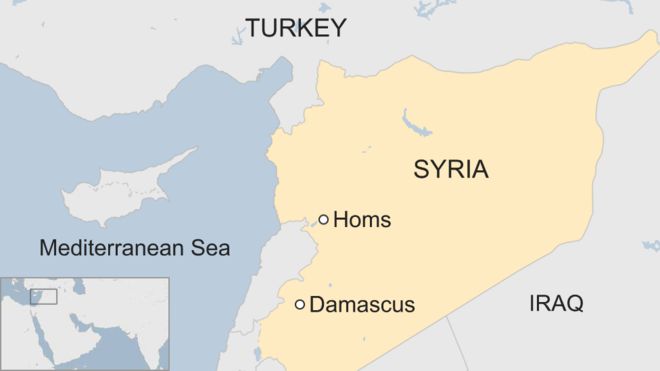Several people have died or were hurt after a Syrian military airport was hit by missiles, state media said, amid international alarm over a suspected chemical attack on a rebel-held town.
Several missiles struck the Tiyas airbase, known as T4, near the city of Homs in the early hours of Monday.
Syria claimed Western involvement, but the US has denied responsibility.
US President Donald Trump said there would be a “big price to pay” after the chemical attack.
He branded Syria’s President Bashar al-Assad an “animal”.
Meanwhile the last rebel fighters in Douma have surrendered and are being bussed out of the enclave after reaching a deal with the government.
Mr Trump and France’s President Emmanuel Macron issued a joint statement on Sunday vowing to “coordinate a strong, joint response” to the alleged attack.
Suspected Syria chemical attack kills scores
But US officials said it did not launch a missile attack.
“At this time, the Department of Defense is not conducting air strikes in Syria,” the Pentagon said in a statement.
“However, we continue to closely watch the situation and support the ongoing diplomatic efforts to hold those who use chemical weapons, in Syria and otherwise, accountable.”
Syria’s state news agency Sana initially called the reported missile strike on the Tiyas airfield a “suspected US attack,” but later dropped the reference to the US.
In April 2017, the US fired 59 Tomahawk cruise missiles at Syria’s Shayrat military airfield in response to a chemical weapons attack on a different rebel-held town, Khan Sheikhoun.
Israel also carried out major strikes on Syrian targets earlier this year. The Israeli military has not yet commented on the Tiyas attack.
Russian warning of ‘dire consequences’
By Jon Sopel, BBC North America editor
We’ve been here before. Almost exactly a year ago, the same horrific images of children choking to death, and President Trump insisting this could not be allowed to stand unanswered.
Then, within days the US military fired cruise missiles at a Syrian airfield where the sarin attack had been launched from. So when Donald Trump says there will be a price to pay, it is no empty threat.
But this time round, the Russians are warning of dire consequences if the West uses this alleged chemical weapon attack as a pretext to intervene in Syria.
Over the weekend the president’s senior national security advisers have been meeting to consider what would be the appropriate response, and Mr Trump has been rallying international support.
Last night he spoke to President Macron of France where the two agreed there should be a strong, coordinated response.
A week ago President Trump said he wanted to pull American troops out of Syria, but he now might be on the brink of ordering a military response, that could drag the US deeper still into this intractable conflict.
What happened in Douma?
Medical sources say dozens of people were killed on Saturday in the attack on Douma, in the Eastern Ghouta region.
One video, recorded by rescue workers known as the White Helmets, shows a number of men, women and children lying lifeless inside a house, many with foam at their mouths.
However, it has not been possible to verify independently what actually happened, or the actual number of dead
The UN Security Council is expected to discuss the crisis on Monday.
Both Syria and Russia deny a chemical attack took place, and have reached an evacuation deal with the Jaish al-Islam rebels who hold Douma.
Moscow said military operations there had been halted. Under the deal, 100 buses are said to be moving 8,000 fighters and 40,000 of their relatives out of the battered town. Hostages who had been held by the rebels are being set free.
The development means pro-government forces have now taken full control of Eastern Ghouta.
Analysts say this is President Assad’s biggest military success since the fall of Aleppo in 2016. It follows a weeks-long government offensive in which more than 1,600 people were killed.
BBC

